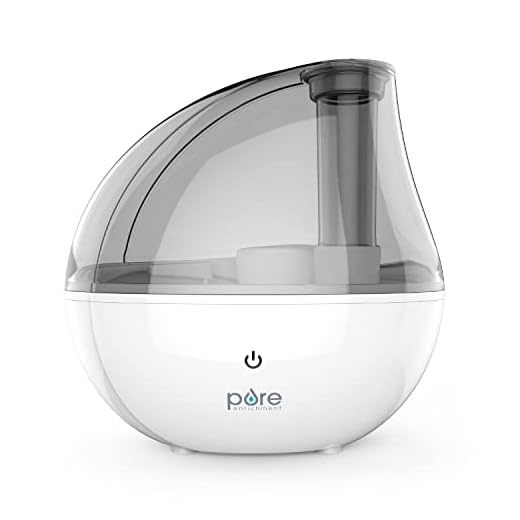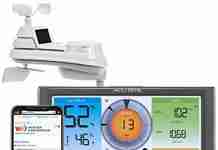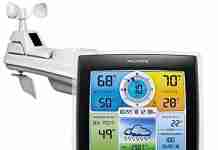During winter, the air inside our homes tends to be dry, and as a result, we experience a lot of discomfort.
To achieve comfort, it is essential to maintain the proper indoor humidity levels throughout the winter months.
This article will examine the benefits of maintaining indoor humidity, ideal humidity levels for the winter season, and how to manage indoor humidity.
Review contents
Why Is Indoor Humidity Important in Winter?
What Are the Effects of Low Indoor Humidity in Winter?
Low indoor humidity levels during winter can lead to a host of problems. Dry air may cause our skin to become dry and itchy and our eyes dry and irritated.
Also, low humidity levels can cause static electricity buildup, damaging electronic devices. Low humidity levels can also lead to respiratory problems such as sinus congestion, lung irritation, and increased susceptibility to common colds and flu viruses.
What Are the Effects of High Indoor Humidity in Winter?
High indoor humidity levels can also lead to many problems, especially when temperatures are low. For instance, excess humidity can cause condensation on windows and walls, leading to mold growth and rot.
It can also cause discomfort and even health problems for residents. A home with high humidity levels during winter may feel clammy and cold, and furniture and other household items may feel damp and cold.
How Can Indoor Humidity Affect My Health in Winter?
Indoor humidity levels in winter can significantly impact our health. As discussed above, we may experience dry skin, eye irritation, and respiratory problems when humidity is low. Conversely, high humidity levels tend to exacerbate allergies and asthma symptoms.
They can even lead to the growth of mold, which can cause serious health problems, especially for people with respiratory conditions.
LEVOIT OasisMist Smart Cool and Warm Mist Humidifiers for Bedroom Large Room Home, Auto Customized Humidity, Ultrasonic Top Fill Oil Diffuser for Baby and Plants, Quiet, 4.5L, White
41 used from $56.98
LEVOIT 4L Humidifiers for Bedroom Large Room & Essential Oil Diffuser, Quiet Cool Mist for Home, Baby and Plants, Last up to 40Hours, Dual 360° Rotation Nozzles, Handle Design, Auto Shut Off, Blue
What Is the Ideal Indoor Humidity Level in Winter?
What Is the Ideal Indoor Humidity Range in Winter?
The ideal indoor humidity range for most homes during winter is between 30% to 50% relative humidity.
This range ensures that the air is comfortable and non-drying while preventing mold and bacteria growth in the household. To maintain this range, you must measure and adjust your indoor humidity levels as needed.
How Can I Measure My Home’s Indoor Humidity Level in Winter?
Measuring your home’s indoor humidity levels is a simple process that you can do using a hygrometer. A hygrometer is a device that measures the amount of water vapor in the air.
You can purchase a hygrometer at most hardware stores, which are relatively inexpensive. Once you have your hygrometer, please place it in a central location in your home away from direct sunlight, and wait for a few minutes for it to give you a reading.
How Can I Adjust My Home’s Indoor Humidity Level in Winter?
There are several ways to adjust indoor humidity levels in winter, including using a humidifier or a dehumidifier. A humidifier adds moisture to the air, while a dehumidifier removes excess humidity.
You may have to invest in a humidifier or dehumidifier to achieve the ideal humidity range mentioned above. Houseplants can also serve as natural humidifiers; you can place them throughout your home to add moisture to the air.
How Do HVAC Systems Affect Indoor Humidity in Winter?
What Is the Role of Heating Systems in Indoor Humidity in Winter?
Heating systems can affect humidity levels in the home by drying out the air. When warm air is introduced into a space with low humidity levels, it tends to absorb moisture, resulting in dry air.
To regulate the humidity levels, you must invest in a humidifier during winter. Alternatively, you may increase natural moisture sources in the home by placing plants strategically.
How Does Air Conditioning Affect Indoor Humidity in Winter?
AA’s well-functioning air conditioning system should maintain the proper humidity levels regardless of the season. Air conditioning systems are not typically used during winter, except in places with year-round humid climates.
However, if your home uses a central air conditioning system year-round, it’s essential to maintain it well and ensure it’s functioning optimally. At the same time, you may also need to invest in a dehumidifier to keep excess humidity in check.
What Is a Whole-Home Humidifier and How Can It Help Manage Indoor Humidity in Winter?
A whole-home humidifier is a device that is installed as part of your home’s heating, ventilation, and air conditioning (HVAC) system.
It’s designed to automatically balance your home’s humidity levels by adding moisture to the air. Whole-home humidifiers are becoming increasingly popular because of their efficiency in regulating indoor humidity during the winter months.
LEVOIT OasisMist Smart Cool and Warm Mist Humidifiers for Bedroom Large Room Home, Auto Customized Humidity, Ultrasonic Top Fill Oil Diffuser for Baby and Plants, Quiet, 4.5L, White
41 used from $56.98
LEVOIT 4L Humidifiers for Bedroom Large Room & Essential Oil Diffuser, Quiet Cool Mist for Home, Baby and Plants, Last up to 40Hours, Dual 360° Rotation Nozzles, Handle Design, Auto Shut Off, Blue
What Are the Best Ways to Maintain Indoor Humidity in Winter?
What Type of Humidifier Is Best for Managing Indoor Humidity in Winter?
The type of humidifier best for managing indoor humidity levels in winter depends on your needs. Two main types of humidifiers are cool mist and warm mist. Cool mist humidifiers use less electricity and are suitable for larger areas as they cool the room.
Conversely, warm mist humidifiers are great for smaller rooms since they make the air warmer and more comfortable. They are also ideal for people who suffer from sinus congestion.
What Are Some Houseplants That Can Help Regulate Indoor Humidity in Winter?
Some plants naturally increase humidity levels in the home, making them great natural humidifiers. Some of the best houseplants for regulating indoor humidity levels in winter include the Boston fern, peace lily, spider plant, and rubber plant.
These plants help to purify the air while adding moisture to the indoor environment. However, it’s important to note that while plants are suitable for increasing humidity levels, they do not produce enough to create the ideal range.
How Can I Prevent Mold Growth Due to High Indoor Humidity in Winter?
Mold growth is a common problem when humidity levels in the home are high during winter. You must control humidity levels and ensure adequate ventilation to prevent mold growth.
You can also invest in a dehumidifier to reduce excess moisture in the air. It would be best if you also aimed to keep your home free of excess moisture sources and repair any leaks as soon as they occur.
Antonki Room Thermometer Indoor Hygrometer, Humidity Gauge, Humidity Meter, Digital Temperature and Humidity Monitors for Home, Baby Room, Terrarium, Incubator, Greenhouse - 2 Pack
$8.49 in stock
ThermoPro TP49 3 Pieces Digital Hygrometer Indoor Thermometer Humidity Meter Mini Hygrometer Thermometer with Temperature and Humidity Monitor Room Thermometer
$19.99 in stock
1 used from $20.18
ThermoPro TP55 Digital Hygrometer Indoor Thermometer Humidity Gauge with Large Touchscreen and Backlight Temperature Humidity Monitor
$15.99 in stock
7 used from $13.59
How to Deal with Condensation and Dry Air in Winter?
What Causes Condensation in Winter and How Can I Prevent It?
Condensation occurs when moist air comes into contact with a cold surface, and the moisture in the air is condensed on the surface.
Condensation is common during winter when temperatures are low and indoor humidity levels are high. You can invest in proper ventilation systems to prevent condensation, increase airflow, and reduce humidity. You can also invest in dehumidifiers to reduce the humidity levels in your home.
Why Is Dry Air a Problem in Winter, and How Can I Address It?
Dry air during winter is a problem because it causes discomfort, irritation, and health problems. To address it, you must invest in a humidifier to add moisture to the air.
However, you should ensure that the humidity levels are not too high, which can cause mold growth and other problems. It would be best to keep the humidity levels within the ideal range discussed earlier.
What Are Some Effective Ways to Increase Humidity and Improve Indoor Air Quality in Winter?
To increase humidity and improve indoor air quality in winter, maintain proper ventilation and invest in a humidifier.
Additionally, it would be best if you kept your home clean to reduce allergens and dust and invest in an air purifier to keep the air clean. You should also ensure that you repair any leaks that result in moisture buildup in your home.
Antonki Room Thermometer Indoor Hygrometer, Humidity Gauge, Humidity Meter, Digital Temperature and Humidity Monitors for Home, Baby Room, Terrarium, Incubator, Greenhouse - 2 Pack
$8.49 in stock
ThermoPro TP49 3 Pieces Digital Hygrometer Indoor Thermometer Humidity Meter Mini Hygrometer Thermometer with Temperature and Humidity Monitor Room Thermometer
$19.99 in stock
1 used from $20.18
ThermoPro TP55 Digital Hygrometer Indoor Thermometer Humidity Gauge with Large Touchscreen and Backlight Temperature Humidity Monitor
$15.99 in stock
7 used from $13.59
Q: What is the ideal indoor humidity level in winter at home?
A: The ideal indoor humidity in winter is between 30%-50%.
Q: How does winter humidity compare to summer humidity in homes?
A: Winter humidity levels are typically lower than summer humidity in homes.
Q: How can I tell if the humidity in my home is too high?
A: Signs of high humidity in your home include condensation on windows, a musty smell, and mold growth.
Q: What can I do to control the humidity levels in my home during winter?
A: Using a humidifier, you can control the humidity in your home during winter.
Q: Can dry indoor air be harmful?
A: Yes, dry indoor air can cause respiratory problems, dry skin, and other health issues.
Q: What is the best humidity range in my home during winter?
A: The best humidity range in your home during winter is 30%-50%.
Q: How can I increase the humidity levels in my home?
A: You can increase the humidity levels in your home by using a humidifier or by adding moisture to the air through plants or bowls of water.
Q: How does the heating and air conditioning affect the humidity levels in my home?
A: Heating and air conditioning can lower the humidity levels in your home by drying out the air, so it’s essential to monitor and control the humidity levels during winter.
Q: Should I be concerned about high humidity levels in my home?
A: High humidity levels can lead to mold growth and other health hazards, so it’s essential to maintain proper humidity levels in your home.
Q: Can the outside temperature fluctuation affect my home’s indoor humidity?
A: Yes, the colder the air outside, the drier it is, which can lower the indoor humidity levels. Properly controlling humidity levels inside your home is essential, depending on the season.
Conclusion
Maintaining the ideal indoor humidity levels during winter is crucial for comfort and good health.
The ideal humidity levels for most homes should be between 30% to 50% relative humidity.
Achieving this ideal range may require investing in humidifiers, dehumidifiers, houseplants, and proper ventilation systems.
Following the tips in this article, you can maintain comfortable indoor humidity levels throughout the winter months and improve your overall well-being.
ThermoPro TP50 Digital Hygrometer Indoor Thermometer Room Thermometer and Humidity Gauge with Temperature Monitor
$9.34 in stock
9 used from $10.44
ThermoPro TP49 Digital Hygrometer Indoor Thermometer Humidity Meter Room Thermometer with Temperature and Humidity Monitor Mini Hygrometer Thermometer
$8.99 in stock
2 used from $8.54
AcuRite Humidity Meter Hygrometer and Indoor Thermometer with Temperature Gauge and Humidity Gauge, Room Thermometer Comfort Scale, 3 x 2.5 Inches, White (01083M)
$16.19 in stock
4 used from $14.19
Google Nest Temperature Sensor- That Works with Nest Learning Thermostat and Nest Thermostat E - Smart Home
$33.67 in stock
2 used from $29.99
Antonki Room Thermometer Indoor Hygrometer, Humidity Gauge, Humidity Meter, Digital Temperature and Humidity Monitors for Home, Baby Room, Terrarium, Incubator, Greenhouse - 2 Pack
$8.49 in stock
ThermoPro TP49 3 Pieces Digital Hygrometer Indoor Thermometer Humidity Meter Mini Hygrometer Thermometer with Temperature and Humidity Monitor Room Thermometer
$19.99 in stock
1 used from $20.18
ThermoPro TP55 Digital Hygrometer Indoor Thermometer Humidity Gauge with Large Touchscreen and Backlight Temperature Humidity Monitor
$15.99 in stock
7 used from $13.59
SMARTRO SC42 Professional Digital Hygrometer Indoor Thermometer Room Humidity Gauge & Pro Accuracy Calibration
$17.99 in stock
Hessaire MC37M Portable Evaporative Cooling Fan for Indoor/Outdoor High Temperature Low Humidity Environments, 3100 CFM, 950 sq. ft., 3-Speed Fan, 120V, 59 dB, Gray
LEVOIT OasisMist Smart Cool and Warm Mist Humidifiers for Bedroom Large Room Home, Auto Customized Humidity, Ultrasonic Top Fill Oil Diffuser for Baby and Plants, Quiet, 4.5L, White
41 used from $56.98
LEVOIT 4L Humidifiers for Bedroom Large Room & Essential Oil Diffuser, Quiet Cool Mist for Home, Baby and Plants, Last up to 40Hours, Dual 360° Rotation Nozzles, Handle Design, Auto Shut Off, Blue
Pure Enrichment® MistAire™ Silver Ultrasonic Cool Mist Humidifier for Bedroom, Office, Nursery & Indoor Plants - Lasts Up to 25 Hours, Whisper-Quiet Operation, Optional Night Light, & Auto Shut-Off
$39.99 in stock
















































